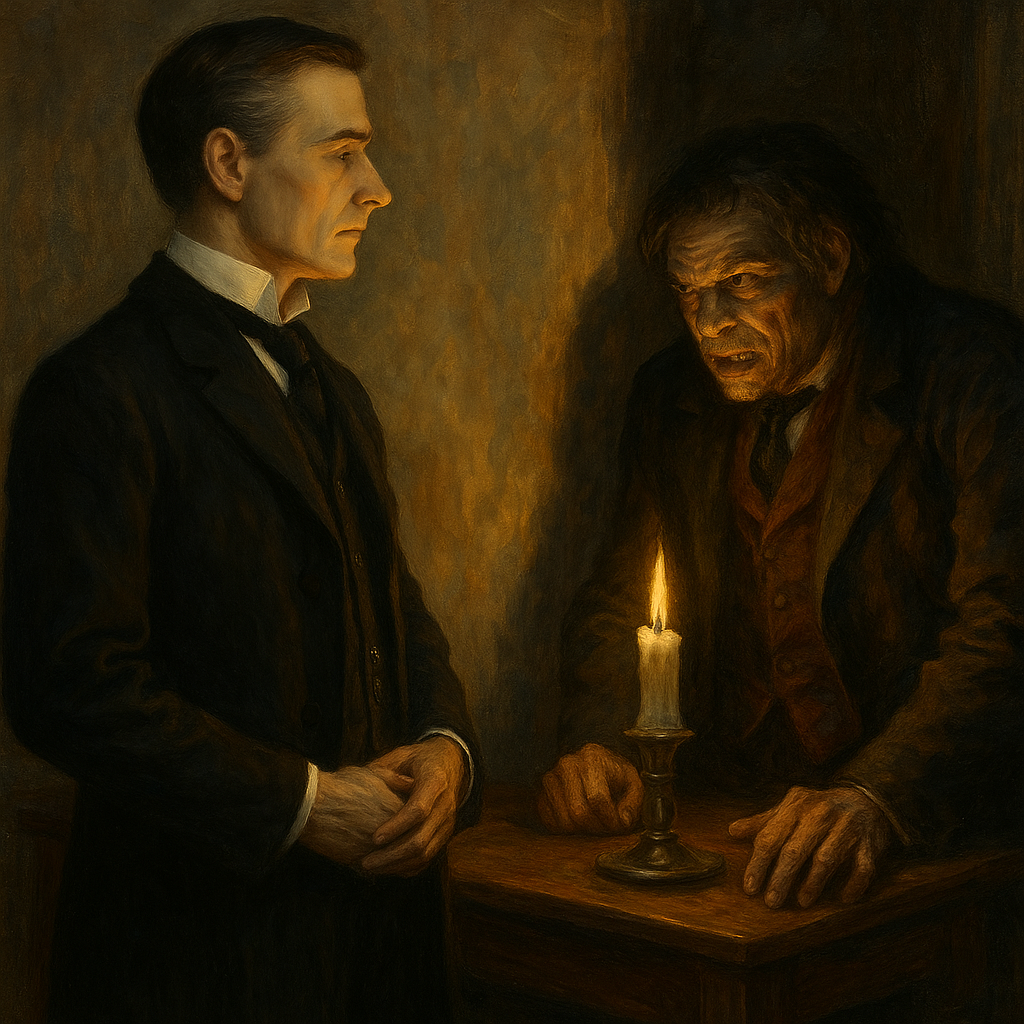By ABS, The Literary Scholar
(Who firmly believes that if repression had a user manual, Victorian men wrote it and then promptly tore it in half by moonlight)
Before there were dual SIM phones, there were dual personalities.
And before Marvel gave us Hulk-smash and Bruce Banner’s brooding remorse, Robert Louis Stevenson handed us a cautionary tale wrapped in fog, fear, and very bad male decision-making.
Enter Strange Case of Dr. Jekyll and Mr. Hyde (1886)—a novella so brief and mysterious that Victorian readers devoured it in one sitting and then politely denied how much it resembled their own social masks.
Let’s be honest: this is not just a story about good and evil. This is a story about a man so emotionally constipated by Victorian decorum that he invents a side hustle for his id. He literally brews a potion to unbutton his own superego. And as you can imagine, things escalate quickly—from guilt-ridden walks to murder with a cane.
Dr. Jekyll: The Well-Respected Gentleman Who Needs Therapy (and a New Hobby)
Dr. Henry Jekyll is the embodiment of Victorian virtue. He hosts dinners. He writes scientific papers. He represses emotions so successfully that even his shadow feels neglected.
“Man is not truly one, but truly two.”
Translation: Jekyll doesn’t just wear a mask—he manufactures an entire alter ego to do what’s unthinkable in daylight. Namely: walk aggressively, indulge in vice, trample children, and occasionally commit homicide by clubbing.
The catch? He doesn’t want to stop. He just doesn’t want to be blamed.
Hence: Mr. Hyde—the spiritual ancestor of every man who says, “That wasn’t me, it was the drink.”
Mr. Hyde: The Id on Two Legs (Short, Hairy, and Morally Uninsured)
Edward Hyde is not just evil—he’s disturbingly underdeveloped, described as troglodytic, ape-like, and spiritually crooked. In other words, Hyde is everything the Victorian gentleman feared being caught doing or feeling.
“There is something wrong with his appearance; something displeasing, something downright detestable.”
That “something” is honesty. Hyde is Jekyll’s unfiltered self. He does not RSVP. He does not apologize. He is what repression looks like when it punches back.
Let’s be clear: Hyde doesn’t grow. He doesn’t evolve. He erupts, because that’s what happens when you bottle up rage, lust, shame, and guilt behind a monocle.
The Real Horror: Not the Crimes, but the Secrecy
The narrative unfolds like a polite legal investigation—through Mr. Utterson, the dull lawyer friend who basically narrates the apocalypse with the emotional excitement of a teacup. He asks questions, raises eyebrows, and unlocks doors—all while Britishly refusing to jump to conclusions.
And what he slowly uncovers is not a ghost story. It’s a man unraveling himself because he doesn’t know how to reconcile desire and decorum.
“I was slowly losing hold of my original and better self, and becoming slowly incorporated with my second and worse.”
That’s not a plot twist. That’s Victorian manhood on trial.
Potions, Personality, and the Great Repression Experiment
Unlike most horror stories, this one is powered not by demons or dark forests—but by Jekyll’s home-brewed identity juice.
This isn’t science fiction. It’s emotional escapism with a lab kit.
Why deal with your vices when you can outsource them to a shorter, nastier you?
Jekyll drinks the potion not once out of curiosity, but repeatedly—because he enjoys Hyde. Until, of course, Hyde starts making the schedule. And suddenly, it’s not about control anymore. It’s about consequences.
Respectability: The Real Monster of the Story
Let’s not forget: Jekyll doesn’t transform because he’s possessed. He transforms because he’s trapped. In an age where virtue was public currency, and guilt was something you quietly passed to your butler, Jekyll’s real fear isn’t being evil—it’s being seen.
And Hyde is everything he doesn’t want to be seen as: impulsive, crude, sexual, violent, honest.
If Jekyll is the man he wants to be, Hyde is the man he already is—just removed from consequence.
And when you strip away Hyde’s crimes, what remains is a sobering truth:
Every man in this novel is hiding something.
Be it a friend’s secret, a shameful past, or an extra personality locked in the basement.
What the Novella Doesn’t Say… But Screams
There’s no woman in this novel worth noting. No domestic harmony. No romance. Just men—suppressing, disguising, judging, and imploding.
The horror here is psychological. Jekyll isn’t afraid of God or Hell. He’s afraid of himself.
And that, dear reader, is Victorian masculinity in a test tube.
And somewhere, ABS, The Literary Scholar, stands at the laboratory threshold, glancing at the shattered beaker and the ruined velvet armchair, murmuring, “Ah. So this is what happens when a man refuses therapy and invents a monster instead.”
Signed,
ABS
The Literary Scholar
(Who firmly believes duality is best handled with journaling, not potions)
(Still checking every foggy alley for Hyde—and every drawing room for denial)
(And who knows that Jekyll wasn’t destroyed by evil… but by etiquette)

Share this post / Spread the witty word / Let the echo wander / Bookmark the brilliance
